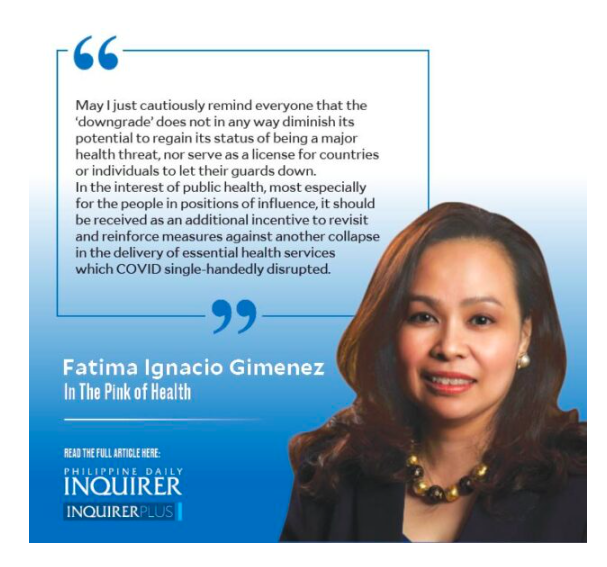Here to stray
“She cannot come to work today.”
“One-third of our resident staff is down with the virus.”
“Should I be taking Molnupiravir even without undergoing the test?”
“We need to sit down and review our infection control policies.”
“You sound like Kermit, have yourself tested.”
“Have you had patients coming in with pink eyes?”
“Not again? Isn’t it her third time getting infected?”
“Allot enough bed spaces for COVID admissions.”
“Achoo!!! It’s just COVID.”
These are snippets of recent conversations. A stark reminder to all of us that COVID-19 is still very much around and likely to stay.
In the past year, we have witnessed a decline in COVID-19-related deaths, hospital, and intensive care admissions as an outcome of having been vaccinated or infected or both, resulting in high-level population immunity and further complimented by better case management.
Recently, the World Health Organization (WHO) declared the virus as no longer a public health emergency of international concern. On receiving the news, one can only wonder about the various reactions to such a pronouncement. Accepting that there will be different points of view, may I just cautiously remind everyone that the “downgrade” does not in any way diminish its potential to regain its status of being a major health threat, nor serve as a license for countries or individuals to let their guards down. In the interest of public health, most especially for the people in positions of influence, it should be received as an additional incentive to revisit and reinforce measures against another collapse in the delivery of essential health services which COVID single-handedly disrupted.
On a regular basis, together with colleagues in government institutions, this is our reality. We see patients with far-advanced tuberculosis, complicated or inadequately treated infections such as pneumonia, meningitis, and regrettably, vaccine-preventable diseases such as measles, rubella, varicella, and diphtheria. The excess of cases is the product of multiple factors aggravated by the pandemic. More than logistical issues is the sad truth that aside from poverty, it is a disturbing lack of knowledge or awareness of the value of primary prevention which persists.
Case in point. COVID and childhood immunizations were given for free. For the former, the appetite was fierce at the onset, tapering off to a near nondemand from pandemic fatigue on top of perceived safety issues. With the ready availability and popularity of various forms of social media, people chose to take mental shortcuts to decision-making to the detriment of the campaign. This was seen to cut across all economic classes.
WHO director general Tedros Adhanom Ghebreyesus was gifted with the words to best explain the last four years of living with the virus: “One of the greatest tragedies of COVID-19 is that it didn’t have to be this way. We have the tools and technologies to prepare for pandemics better, detect them earlier, respond to them faster, and communicate their impact. But globally, a lack of coordination, a lack of equity, and lack of solidarity meant that those tools were not used as effectively as they could have been. We must promise ourselves and our children and grandchildren that we will never make those mistakes again.”
The pandemic is a perfect example of history repeating itself. Oftentimes I hear people saying, “Let’s move on for there is no use in dwelling in the past.” I have to disagree. True and genuine progress will always be a marriage of new ideas and lessons learned from yesteryears. As a people, we must not succumb to the dangerous habit of having short memories all because it is the easiest way out. Let us not accept that our current situation is what we deserve or the one that we asked for. We don’t need to reach a certain status to pass on a legacy. Being mindful and living responsibly is more than enough.
The supplemental immunization activity of the Department of Health for measles, rubella, and bivalent polio will run through the whole month of May. Together with the other stakeholders, we appeal for your much-needed support.
[email protected]
Disclaimer: The comments uploaded on this site do not necessarily represent or reflect the views of management and owner of Cebudailynews. We reserve the right to exclude comments that we deem to be inconsistent with our editorial standards.

